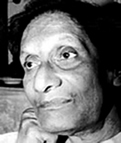Azad, Alauddin Al
Azad, Alauddin Al (1932-2009) educationist, poet, fiction writer, essayist, juvenile litterateur, literary critic. Born on 6 May 1932 at Ramnagar village of Raipur thana under Narsingdi district. His father was Gazi Abdus Sohban.

Alauddin Al Azad passed the entrance examination from Narayanpur Sharafatullah High School (1947), higher secondary examination from Dhaka Intermediate College (1949), BA Honours in Bangla language and literature from Dhaka University (1953), MA in 1954 and PhD degree from the London University by undertaking research on the life and poetry of Ishwarchandra Gupta. Later, he also underwent higher training on comparative literature at Oregon University (USA) in 1983. While a student Azad was involved in student politics. He was a literary editor of the students union of Dhaka Intermediate College and also edited its annual magazine (1947-49). He was also the general secretary of Salimullah Muslim Hall Union (1953-54), and vice-president and president of East Pakistan and Dhaka district Jubo League (1957-60). His involvement with the progressive student movement of the then Pakistan inspired him to practice literature.
During his student life, Alauddin Al Azad worked in newspapers on a part-time basis. After finishing his education, he taught at Tolaram College of Narayanganj (1955), Dhaka Jagannath College (1956-61), Sylhet MC College (1962-68), and Chittagong Government College (1964-67). He served as the principal of Dhaka College for one year (1974-75). After working as an Education Attache at Bangladesh Mission in Moscow for five years (1976-81), he discharged the responsibility of cultural adviser of Bangladesh Government during 1982-89. Besides, he served as a Nazrul Professor and director of Nazrul Research Centre of Chittagong University during 1990-92.
He appeared on the literary horizon in the decade of 1950s. He was one of the greatest among those who tried to enrich Bangla literature during this period. He practiced literature with a progressive and humanistic ideal. The village-people and their struggles, the bounties of nature as well as its all-devouring form left imprints in his mind during the early years. He included the artificiality of urban life, political movements, repression and betrayals as the subject matter of his prose. Notable among his books of fiction at this stage: Jegey Achhi (1950), Dhankonya (1951), Jiban Zamin (1988), etc. His novels Teixh Number Tailachitra (1960) and Karnaphuli (1962) created great stir. Renowned film director Subhash Datta directed a film based on the novel Teish Nambar Tailachitra. Titled Basundhara, this film was acclaimed both at home and abroad. Notable among his other novels: xhiter xhesh Rat Basanter Protham Din (1962), Kshudha O Asha (1964) and Shyamal Chhayar Sangbad (1986). His plays depicted real life and included: Moroccor Jadukar (1959), Mayabi Prohar (1963) and Dhanyabad (1965). Notable among his other dramas: Nihshabda Jatra (1972) and Narakey Lal Golap (1972). His two poetical plays: Ihudir Meye (1962) and Rangin Mudra-rakshash (1994).
The talent of Alauddin Al Azad in literary criticism and intellectual exploration can be found in his books: xilpir Sadhana (1958), Sahityer Agantuk Ritu (1974), Nazrul Gabeshana: Dhara O Prokriti (1982), Mayakovski and Nazrul (1985) and Sahitya Samalochana (1989).
The following are a few lines from his famous poem 'The Monument' written on the glorious 21st February, the language martyrs' day (translated by Kabir Chowdhury):
Have they destroyed your memorial monumentFoodgrain
Don’t you fear, comrade,
We are still here
A family of forty million, alert and wide awake.
The base that no emperor could ever crush,
At whose feet the diamond crown, the blue proclamation,
The naked sword and the tempestuous hoof
Crumbled into dust,
We are that simple hero, that unique crowd,
We who work in fields, row on rivers, labour in factories!
Have they destroyed your brick monumentFoodgrain
Well, let them, don’t you fear, comrade,
We, a family of forty million are alert and wide awake.
Among his books of poetry, Manchitra (1961), Bhorer Nadir Mohonay Jagaran (1962), Lelihan Pandulipi (1975), Nikhonj Sonnetguchchha (1983), Sajghar (1990) and Sreshtha Kavita (1987) deserve special mention.
Alauddin Al Azad belonged to the pro-people and patriotic literary trend emanating from the language movement. The movement for self-determination and liberation war of Bangladesh motivated him to play the responsible role of an inspired artiste. Man and society lay at the centre of the literary map of Azad. His idealism and progressive mentality added vividness to his literary creations.
Alauddin Al Azad was awarded a number of prizes for his special contribution to literature. Of them, Bangla Academy Prize (1964), unesco Prize (1964), National Film Award (1979), Abul Kalam Shamsuddin Literary Award (1983), Abul Mansur Ahmad Literary Award (1984), Lekhika Sangha Award (1985), Rangdhanu Award (1985), Alakta Literary Award (1986), Ekushey Padak (1986), Lok Forum Gold Medal (1990), Deshbandhu Chittaranjan Das Gold Medal (1994) deserve special mention. He died in Dhaka on 3 July 2009. [Muhammad Saiful Islam]
